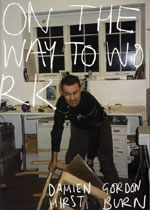Spit and Polish | |

| I've never been a fan of Damien Hirst, either as artist or as Britpack lout. So it came as some surprise to myself that I bought a three-pound remainder copy of On The Way To Work, his book of interviews, on a recent visit to Fopp Records. Despite always arguing against the contextualisation of painting and sculpture, preferring to let what is actually there in the gallery to speak for itself, there is of course something fascinating about the why and how of making art. Especially when you can't stand the art someone makes, or most of what you think he stands for. So what does young Damien have to say for himself, now he's abandoned the metropolis for the northern parts of Devon, where there's only a weekly bus for public transport, and maps are still marked 'details unknown'? Well, quite a lot really. You have to give it to the chap, that he's prepared to bare his soul - or appear to [not to mention most of his own anatomy], and this book is raw, unedited, uncensored Hirst, sounding off about everything: drugs and sex, his famous friends, and sometimes even art. What I found admirable was the "fuck you" and carry-on-regardless attitude he has. Towards everything and everybody. He knows what he wants to make and has done it. Of course, money helps, and it's this that has helped him realise that you can buy anything if you want it. Which of course he does. And he can afford it... But it's clear from the book that there's a lot more thought gone into his work than I perceived, and whilst it hasn't really changed my attitude to what in my mind is basically art as a one-line joke, art as post-Duchampian cynical-product-placement or sensation-seeking object, I find the contradiction between slick and the raw stuff of Hirst's thought processes an interesting tension. |

| Peter Gabriel can never be accused of being 'raw', and for me there is little tension in his work. Whilst he might once have been perceived as being a pioneer in world music [particularly with his involvement in setting up WOMAD] and production [the radical drum sound on Peter Gabriel 3 which Phil Collins (wash your mouth out) appropriated for his own use] or the use of the Fairlight synthesizer, Gabriel's recent music has been swamped by overproduction and layering. It might be pristine and beautiful-sounding, but it's also cold and bereft of excitement or passion. With a first few listens, UP produced a similar response. This is another "big" sounding CD, polished to sterile perfection. It's also been ten years in the making and it has to be said some of the sounds present sound ten years old; this isn't a 21st century record at all. Further listens allow songs to be heard, tunes start insinuating their way into my head, and the dislike subsides, though I'd still love to hear them as demos, or played by someone else with a bit of verve and looseness. For the first time, too, I found elements of Gabriel's old band Genesis present in the music, a certain tone or way of carrying a tune. Not unwelcome, but surprising 30 years on. Gabriel could do worse than listen to his own first album again, which although carefully produced was quirkily arranged, with diverse instrumentation augmenting sparse soulful tunes. He could also listen to Ryan Adams' recent release, Demolition, a collection of demos from five unreleased projects. It doesn't hold together as an album, but when individual songs are as wonderful as these who cares? Adams wears his influences on his sleeve - indeed sometimes he seems to have swallowed them whole - and as ever one can hear a mix of Neil Young, Joni Mitchell, Nick Drake in his quirky mix of rock and alt.country. Adams splutters and emotes his way through hybrids of half-rememebered, half-appropriated tales of woe and passion. The music swaggers and sweats, spitting on music like that of Gabriel, far more articulate than Hirst's confessional ramblings. There's no need to polish - this boy knows how to rock, and has a heart of gold, and a beautiful soul. © 2002 Rupert Loydell |